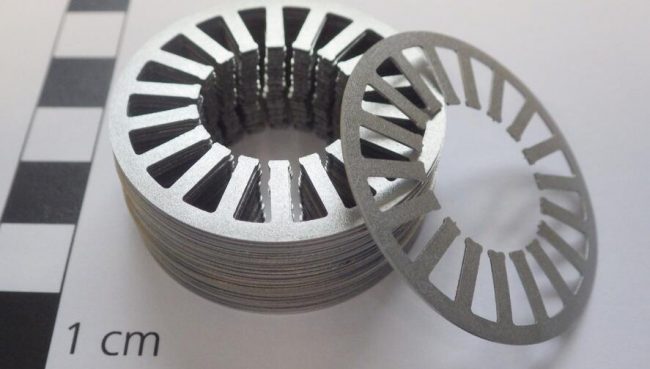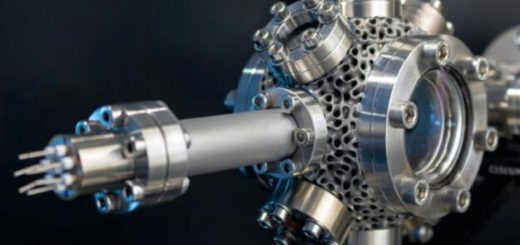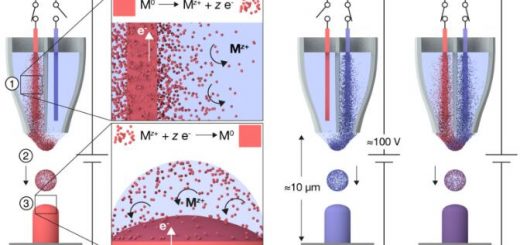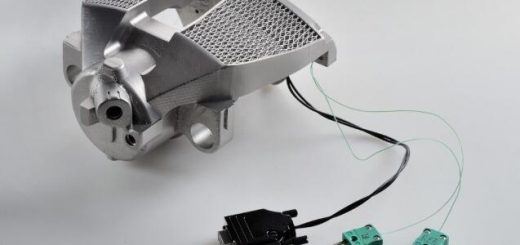Project for Efficient And Resource-Saving Engine Production Started: Fraunhofer IFAM Dresden Develops Printed Metal Sheets for Electric Drives
A project for the efficient production of electrical sheets for electric drives has been launched at the Fraunhofer Institute for Manufacturing Technology and Advanced Materials IFAM in Dresden. Coordinated by Siemens, the “EffiBlech” project is being carried out jointly with partners from the Chair of Manufacturing Automation and Production Systems at the Friedrich Alexander University of Erlangen-Nuremberg and the companies EKRA Automatisierungs GmbH, MUT Advanced Heating GmbH, and Optonic GmbH to develop a complete process chain with production and testing methods. The end result will be more efficient electrical sheets for electric drives.
 Stator laminations manufactured by 3D screen printing
Stator laminations manufactured by 3D screen printing
© Fraunhofer IFAM Dresden
The aim is to produce thin electrical sheets using a printing route. Fraunhofer IFAM in Dresden is contributing its expertise in powder metallurgical manufacturing processes such as the metallic 3D screen printing process to the project. The main tasks of Fraunhofer IFAM in the consortium are the selection of suitable low-cost powders, the development of pastes, and the optimization of the printing process for the individual sheets.
The motivation of the project is to increase motor efficiency by reducing unwanted eddy currents that occur in electric drives during energy conversion. Eddy currents are losses that cause the machine to heat up and must be dissipated. These losses can be significantly reduced by reducing the thickness of the sheet.
Such electrical sheets are usually produced in complex multi-stage forming and heat treatment processes and then processed into rotor or stator laminations. Due to the rolling and punching process steps, the minimum thickness to be processed is limited and is between 0.2 and 0.65 mm as standard. This means that eddy current losses cannot be reduced further. In addition, up to 50 % of material offcuts occur when forming the laminations of the electrical steel sheets. Consequently, a large part of the unused expensive material must be reprocessed.
In the “EffiBlech” project, challenges in all sub-processes of thinner sheet production are addressed. This ranges from paste production and screen printing to heat treatment. Handling and insulation in the sheet stack are also being optimized and an inspection system is developed to ensure high quality in near-series prototype production.
After all process steps have been optimized, the electrical sheets are finally installed in motors and tested.
A specific example of the potential savings that can be achieved with the results is soft magnetic components in asynchronous motors. Here, core losses can be reduced by 10 % and material costs in production by 20 %. Various measures, such as fully automating the screen printing process and increasing the usable screen area, increase the productivity of the entire process. As a result, the CO2 footprint in the production of asynchronous motors can be reduced by around 20 %, and by as much as around 40 % in the sheet package.
In addition to 3D screen printing, which is relevant to this project, Fraunhofer IFAM in Dresden has a wide range of other additive manufacturing processes available to you at the Innovation Center Additive Manufacturing ICAM®. Here, you can avail of the technologies of selective electron beam melting, metal-based fused filament fabrication, lithography-based metal manufacturing, MoldJet®, gel casting, and 3D screen printing.
Source: Fraunhofer
For press release, welcome to send to 3D Science Valley at 2509957133@qq.com




Recent Comments